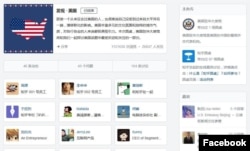The U.S. embassy in Beijing is taking a break from publicly engaging Chinese people through social media, after its latest online diplomacy effort was shut down earlier this month without explanation.
In a statement emailed to VOA Sunday, the embassy's Beijing press office said: "we do not have any specific plans to announce at this time" for new social media outreach in China.
In the last outreach attempt, four Beijing-based U.S. diplomats partnered with Chinese question-and-answer website Zhihu in late April to answer web users' questions about life in the United States.
A cached version of the "Discover America" webpage shows that it got 1 million views before being deleted May 17. That same day, China's Communist Youth League went on social media to say some Chinese web users were unhappy with the U.S. diplomats for trying to make America look good in the battle for Chinese public opinion.
US concern
The U.S. embassy expressed disappointment with the shutdown of the Q&A session, and said it relayed that message to Chinese authorities. It told VOA: "We look forward to opportunities to engage in genuine dialogues about issues and ideas of interest to Chinese and American people."
Beijing has declined to comment directly on the U.S. complaint. But China's state-run Global Times news site published an editorial May 25 that appeared to send a mixed message. The editorial said it is unnecessary for Chinese internet regulators to be "overly nervous" about every word coming from the United States. It also warned the U.S. embassy not to let its diplomats become "overly active" in trying to influence Chinese opinion.
In an interview for VOA's China 360 podcast, Foreign Policy magazine senior editor David Wertime said it is not clear what the U.S. diplomats can do on social media because China has not codified its position into law.
Lack of clarity
He said the legal uncertainty benefits China's government "because it ensures a degree of self-censorship that in some cases goes beyond what authorities might actually require."
Wertime said he thinks someone at Zhihu may have deleted the U.S. embassy's Q&A page as an act of self-censorship.
"One thing I can say for certain is that there is a good deal of anxiety in some private internet companies about precisely what is OK and what is not," he said. "Clearly an organization like Zhihu would not want to imperil, or do anything that it felt would imperil, its ability to continue to exist as a site."
U.S. social networking giant Facebook has not appeared to show any anxiety about U.S.-based Chinese diplomats using its platform to communicate with Americans. Those diplomats administer a Facebook page for the Chinese consulate in San Francisco.
Engaging Americans online
In some of its latest posts, the Chinese consulate's Facebook page shared photos of Chinese Ambassador to Washington Cui Tiankai hosting a musical event in honor of U.S. Supreme Court Justices Ruth Bader Ginsburg and Sonia Sotomayor. It also posted a political message saying China's "historical rights" in the South China Sea are “undeniable."
Wertime said he is not aware of the U.S. government expressing any concern about the Chinese diplomats' Facebook postings.
"Obviously we have much more robust free speech protections here in the United States — protections which extend to non-citizens," Wertime said. "And we have different values that animate our legal regime here. So it is not surprising that foreign diplomats would get more leeway in the United States than they would in China."
China's embassy in Washington did not respond to questions from VOA about the goals of its diplomats' social media outreach.
Beijing has not only been putting its diplomats on Facebook. Chinese state-run news outlets have been using Facebook to great effect. Four of those outlets — People's Daily, China Xinhua News, China Daily and Global Times — have 33 million Facebook followers combined.
Differing standards
Wertime said those Chinese news sites have been enjoying an American culture for tolerance and free speech that does not exist in China.
"And some people have pointed out this discrepancy and have suggested that we should not be allowing such a degree of latitude to Chinese governmental organs operating in the United States," Wertime said.
China does not provide such freedoms to U.S. media, blocking their news sites when they post content deemed sensitive by Beijing. But Wertime said Chinese leaders do not appear to be too worried about U.S. perceptions of a double standard.
"I think what [China's leaders] are more concerned about is maintaining control and stability," Wertime said. "And what they might say in response to the criticism is, 'yes we do have two sets of standards: you have your laws in the United States, we have our laws in China, and you have got to obey our laws when you are operating in China.' I think the problem there is that it is unclear exactly what it means to obey the rules and regulations in China, because they are so strategically ambiguous."
















